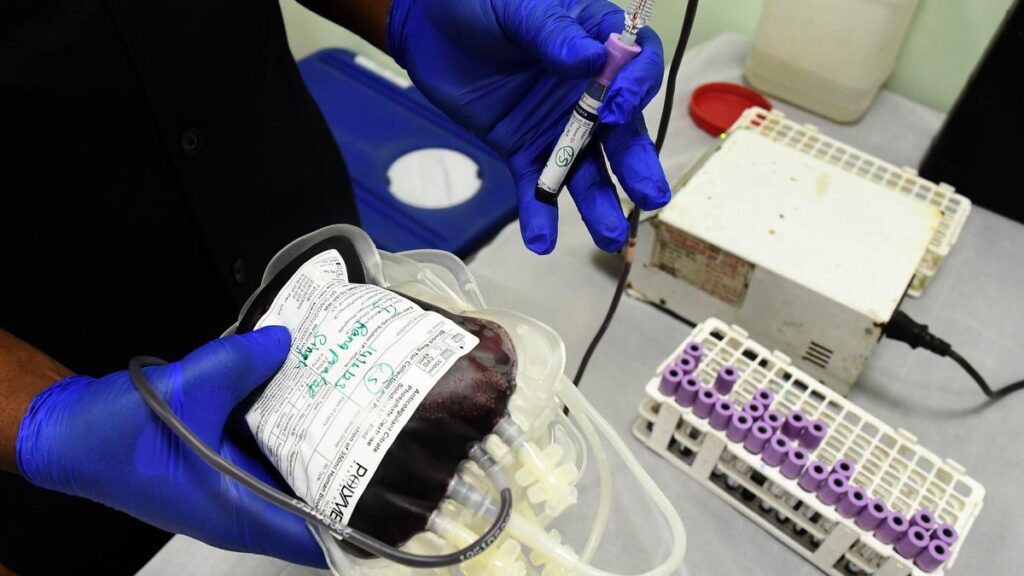
As researchers continue to explore the vast complexity of the human genome, it is likely that even more rare blood types will come to light–each with the potential to reshape how we understand compatibility and safety in transfusion medicine |Image used for representational purpose only
| Photo Credit: RAMAKRISHNA G
In a groundbreaking announcement, France’s national blood agency, the Établissement Français du Sang or French Blood Establishment (EFS), has identified a completely new blood group system, now officially recognised by the International Society of Blood Transfusion (ISBT). Named EMM-negative and colloquially dubbed “Gwada negative” in reference to the Guadeloupean origin of the woman who carries it, this blood type is unlike any other. As of June 2025, only one person in the world is known to possess this blood type, making it the rarest ever recorded.

What is Gwada Negative?
Gwada negative is the informal name given to the newly classified EMM-negative blood group system, officially registered by ISBT as ISBT042. It is defined by the absence of the EMM antigen, which is normally found on red blood cells and is considered a high-incidence antigen. High-incidence antigens are present in nearly all humans, so the lack of one, as in this case, is extremely rare and medically significant.
According to the ISBT, for a blood group to be considered a new system, it must fulfill several criteria: it should be genetically determined, inherited, identifiable via serological or molecular techniques, and have an associated antibody — criteria that EMM-negative meets. The identification of the EMM-negative blood type adds to the previously known 47 blood group systems, making it the 48th globally recognised system in transfusion science.
How was it discovered and by whom?
The story began back in 2011, when a 54-year-old woman from Guadeloupe, who was living in Paris, underwent routine blood tests before surgery. During testing, scientists noticed an antibody that could not be identified by known blood group systems. At the time, the technology needed to analyse the anomaly wasn’t fully developed.
According to Thierry Peyrard, a medical biologist with the EFS who led the research, it wasn’t until 2019 that researchers used high-throughput DNA sequencing — also known as next-generation sequencing (NGS), a technology that enables the rapid sequencing of vast amounts of DNA or RNA in parallel, significantly increasing speed and efficiency compared to traditional methods — to uncover the unique genetic mutation responsible for the absence of the EMM antigen.
Their research was conducted over many years and after thorough validation and peer review, the ISBT officially recognised the discovery in June 2025 during its meeting in Milan. The woman’s blood was found to possess a completely new serologic profile, confirming a novel and rare blood group system.

Who has it and why is it so rare?
As of now, the woman from Guadeloupe is the only known person in the world to possess this blood type. Her case is especially unique because she inherited the mutated gene from both her mother and her father, each of whom likely carried a single copy of the rare gene variant. This dual inheritance led to a complete lack of the EMM antigen in her red blood cells.
According to Dr. Peyrard, this woman is “compatible only with herself,” meaning that no currently identified donor could safely give her blood in the event of a transfusion. The rarity of her case is due to the extremely high prevalence of the EMM antigen in the human population; nearly everyone has it. When a person lacks such a high-frequency antigen, it places them in an extremely rare blood group category. Scientists now hope to identify others who might share the same genetic variant to better support patients with similar needs in the future.

Why does it matter clinically?
The discovery of Gwada negative is far more than a scientific curiosity — it has important implications for transfusion medicine. Individuals who lack common red blood cell antigens like EMM can produce alloantibodies (antibodies produced by an individual in response to foreign antigens from another individual of the same species) against them. If such individuals receive blood containing the antigen they lack, their immune system may recognise it as foreign, potentially leading to dangerous transfusion reactions, including hemolysis –premature destruction or breakdown of red blood cells. In this patient’s case, no donor blood containing the EMM antigen would be safe.
According to the EFS and transfusion specialists, recognising rare blood groups like this one is crucial for ensuring safe transfusions and for guiding blood banks in identifying, cataloging, and preserving rare blood units. It also highlights the importance of building and maintaining international rare blood donor registries that can provide lifesaving support in critical situations.
Specialists hightlight that the formal recognition of the EMM-negative, or “Gwada negative,” blood type represents a critical advancement in haematology and transfusion medicine. This rare blood type broadens the scientific understanding of human immunohematological diversity and highlights the essential role of advanced genetic screening in ensuring safe and accurate blood matching, particularly in complex clinical and emergency settings.
Published – June 22, 2025 05:28 pm IST

